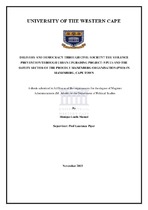Delivery and democracy through civil society? The violence prevention through urban upgrading project (vpuu) and the safety sector of the proudly Manenberg organisation (pmo) in Manenberg, Cape town
Abstract
Post-apartheid local government in South Africa has significant responsibilities in terms of redressing the socio-economic imbalances of the past, including basic service delivery and fostering local economic development. In meeting the socio-economic and material needs of communities, local government is also required to be democratic by enhancing various forms of public participation in governance and through the election of community representatives for local decision-making. So far as participation is concern, Cornwall (2002), distinguishes between two forms of mechanisms for public participation to include; ‘invited spaces’ (authorized participation) and ‘invented spaces’ (unauthorized participation). In the context
of local government in South Africa, invited spaces include elections ward committees and public consultation around the annual budget and integrated development planning (IDP) process. While, invented spaces include protest, civil society engagement with the state and social movement activities. However, the last ten years has revealed that, the promise of effective, responsive and inclusive local governance has not been fulfilled. Rather local government has proven to be
unresponsive as revealed by increasing protests over poor service delivery, as well as formal assessments of local government performance. In this context of poor state performance and unresponsiveness, substantial literature points to civil society as a source for deepening democracy and active citizenship. This thesis explores one version of this idea by examining two civil society programmes in the impoverished and gang-ridden community of Manenberg in Cape Town. More specifically this thesis examines the security programme of the Proudly Manenberg
Organisation (PMO) and the infrastructure development programme of the Violence
Prevention Through Urban Upgrading Programme (VPUU). Contrary to the claim that civil society is a source for enhancing democracy and service delivery, this thesis has found that neither of these programmes has yielded much in terms of fostering democracy and service delivery. In interrogating concerns regarding forms of representation, accountability and participation, it may be argued that in terms of both representation and accountability, the PMO represents and accounts to a certain minority only. Moreover, there is evidence to suggest that participation in the safety sector activities reinforces rather than challenging the coercive rule
iii of gangs (drug lords) in Manenberg. With reference to VPUU, failure to implement the programme has frustrated many potential community allies. Furthermore, inclusion in the VPUU project in Manenberg was only accorded to two NGOs (notably PMO), despite the fact that there are two hundred and thirty NGOs conducting activities in Manenberg. This has limited participation in the first stages of the project to those groups. While, the VPUU project has delayed in Manenberg, its representatives have also been seen to be unaccountable to the community. In short, with reference to Manenberg, the notion that civil society can solve or model alternative solutions to democratic development remains farfetched.

